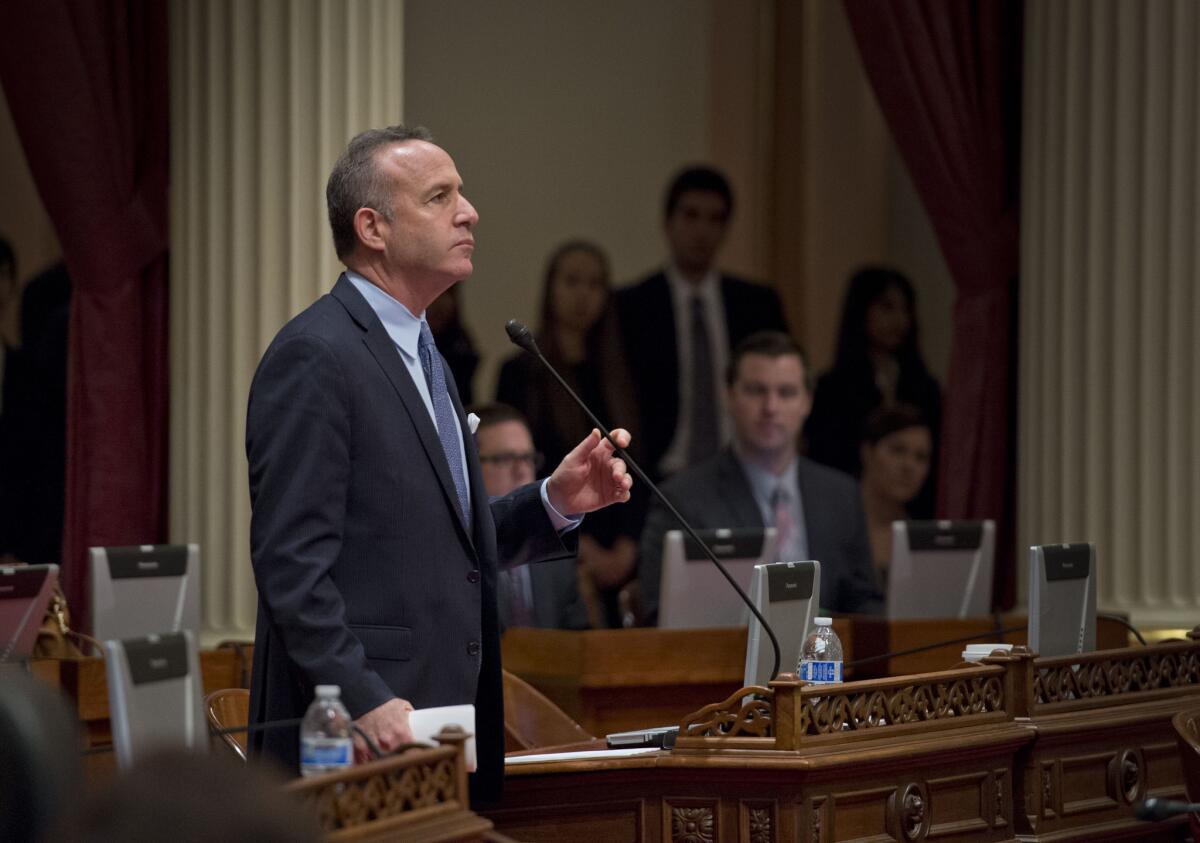Calif. Senate adopts new ethics standards, rejects others

- Share via
Reporting from Sacramento — The state Senate took action Monday aimed at restoring public trust after a series of scandals by creating a new position of ethics ombudsman, installing protections for whistle-blowers and banning the raising of campaign funds during August, the last month of the legislative year.
State Senate President Pro Tem Darrell Steinberg (D-Sacramento) said the resolutions that change the rules for the Senate operations this year, when combined with other proposed ethics laws, “will lead to, I hope and believe, a positive cultural change and strengthen the integrity of this great institution.”
However, Sen. Alex Padilla (D-Pacoima) failed to muster the two-thirds vote needed to put the fundraising blackout period into law and apply it to the Assembly as well as the Senate. His bill fell four votes short of the number needed for approval.
Senate Republican leader Robert Huff of Diamond Bar said he withheld his vote on the blackout bill because “we don’t believe this bill goes far enough.” He offered to work on changes and Padilla may bring the measure back for another vote. Sen. Joel Anderson (R-Alpine) voted against the bill and the rule changes, saying they will would not be effective.
“I don’t believe any rule is going to keep somebody who is crooked, honest,” Anderson told his colleagues. “Dishonest members will always be dishonest no matter what we do.”
The Senate approved a separate Padilla measure that would prohibit elected officials from raising campaign funds for two committees for two different offices at the same time. Some lawmakers have two or three committees set up to raise funds and often officials end up not running for the second office but spending the money.
“It seems to make sense that if you can’t run for more than one office at a time, you shouldn’t be able to raise money for more than one office at a time,” Padilla told his colleagues.
The rule changes were welcomed by Kathay Feng, executive director of California Common Cause.
“These are significant changes, particularly the ban on fundraising from lobbyist employers during the budget period, that could have a positive impact,” Feng said. “Ideally, these rules would be strengthened and put into law, but this is a good start.”
The proposals were made by Senate leaders in response to the March suspensions of Democratic Sens. Leland Yee, Ronald S. Calderon and Roderick Wright, who all are fighting criminal charges.
The Senate approved Senate Resolution 43, which says that the Senate Rules Committee will appoint an ethics ombudsman “to facilitate the receipt of information about potential ethical violations,” and to “ensure that an informant or complainant does not suffer adverse consequences with respect to his or her employment.”
The ombudsman will maintain a hot line and will refer complaints that appear to have merit to the chairs of the Committee on Legislative Ethics or Rules Committee. The new Senate rule, authored by Steinberg also allows for a private letter of admonishment to a senator for “an inadvertent, technical, or otherwise de minimis violation.”
Another rule adopted for this two-year legislative session prohibits senators from soliciting or accepting contributions from a lobbyist employer starting Aug. 1 and continuing until Aug. 31, the end of the legislative year.
Sen. Kevin de Leon (D-Los Angeles) introduced Senate Resolution 44, saying it “seeks to strengthen public confidence in the Legislature and ensure that members of the Senate are focused exclusively on legislative business at these crucial times in the legislative calendar.”
Senate Resolution 45 by Steinberg updates the standards of conduct of the Senate to require each senator to conduct business “so as to justify the high trust provided in the lawmaker by the people” and “to promote public confidence in the integrity of the Senate.”
The Senate also approved a watered-down bill setting new limits on gifts and the use of campaign funds. The measure by Sen. Jerry Hill (D-San Mateo) initially would have barred acceptance of gifts of travel worth more than $7,000 but was changed to only require nonprofit groups that pay for legislators’ travel to disclose the donors who made it possible.
“SB 831 will help improve and modernize California’s Political Reform Act,” Hill told his colleagues. “It increases transparency of travel-related gifts.” The bill also prohibits elected officials from using campaign funds or soliciting donations for nonprofits run by family members of the official.
A provision that would have barred using campaign funds to pay for criminal defense expenses was taken out at the request of Senate leaders, but the measure, which next goes to the Assembly for consideration, would prohibit the use of campaign funds to buy clothes, pay mortgages or give gifts to family members.
More to Read
Sign up for Essential California
The most important California stories and recommendations in your inbox every morning.
You may occasionally receive promotional content from the Los Angeles Times.














